
sail
LakeSail's computation framework with a mission to unify batch processing, stream processing, and compute-intensive AI workloads.
Stars: 1171
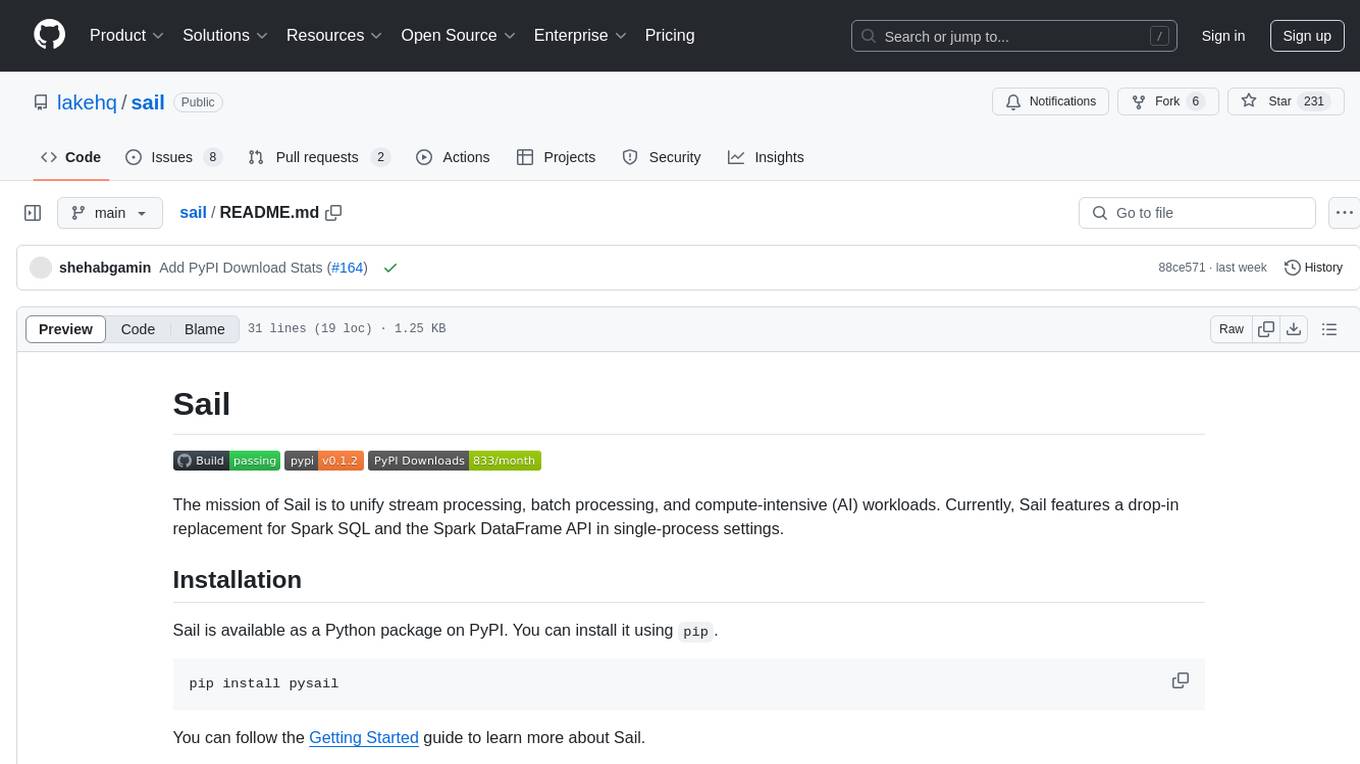
Sail is a tool designed to unify stream processing, batch processing, and compute-intensive workloads, serving as a drop-in replacement for Spark SQL and the Spark DataFrame API in single-process settings. It aims to streamline data processing tasks and facilitate AI workloads.
README:
Sail is an open-source unified and distributed multimodal computation framework created by LakeSail.
Our mission is to unify batch processing, stream processing, and compute-intensive AI workloads. Sail is a compute engine that is:
- Compatible with the Spark Connect protocol, supporting the Spark SQL and DataFrame API with no code rewrites required.
- ~4x faster than Spark in benchmarks (up to 8x in specific workloads).
- 94% cheaper on infrastructure costs.
- 100% Rust-native with no JVM overhead, delivering memory safety, instant startup, and predictable performance.
🚀 Sail outperforms Spark, popular Spark accelerators, Databricks, and Snowflake on ClickBench.
The documentation of the latest Sail version can be found here.
Sail is available as a Python package on PyPI. You can install it along with PySpark in your Python environment.
pip install pysail
pip install "pyspark[connect]"Alternatively, you can install the lightweight client package pyspark-client since Spark 4.0.
The pyspark-connect package, which is equivalent to pyspark[connect], is also available since Spark 4.0.
You can install Sail from source to optimize performance for your specific hardware architecture. The detailed Installation Guide walks you through this process step-by-step.
If you need to deploy Sail in production environments, the Deployment Guide provides comprehensive instructions for deploying Sail on Kubernetes clusters and other infrastructure configurations.
Option 1: Command Line Interface. You can start the local Sail server using the sail command.
sail spark server --port 50051Option 2: Python API. You can start the local Sail server using the Python API.
from pysail.spark import SparkConnectServer
server = SparkConnectServer(port=50051)
server.start(background=False)Option 3: Kubernetes. You can deploy Sail on Kubernetes and run Sail in cluster mode for distributed processing. Please refer to the Kubernetes Deployment Guide for instructions on building the Docker image and writing the Kubernetes manifest YAML file.
kubectl apply -f sail.yaml
kubectl -n sail port-forward service/sail-spark-server 50051:50051Once you have a running Sail server, you can connect to it in PySpark. No changes are needed in your PySpark code!
from pyspark.sql import SparkSession
spark = SparkSession.builder.remote("sc://localhost:50051").getOrCreate()
spark.sql("SELECT 1 + 1").show()Please refer to the Getting Started guide for further details.
Sail supports a variety of storage backends for reading and writing data. You can read more details in our Storage Guide.
Here are the storage options supported:
- AWS S3
- Cloudflare R2
- Azure
- Google Cloud Storage
- Hugging Face
- HDFS
- File systems
- HTTP/HTTPS
- In-memory storage
Sail provides native support for modern lakehouse table formats, offering reliable storage layers with strong data management guarantees and ensuring interoperability with existing datasets.
Please refer to the following guides for the supported formats:
Sail supports multiple catalog providers, such as the Apache Iceberg REST Catalog and Unity Catalog. You can manage datasets as external tables and integrate with broader data-platform ecosystems.
For more details on usage and best practices, see the Catalog Guide.
Derived TPC-H results show that Sail outperforms Apache Spark in every query:
- Execution Time: ~4× faster across diverse SQL workloads.
- Hardware Cost: 94% lower with significantly lower peak memory usage and zero shuffle spill.
| Metric | Spark | Sail |
|---|---|---|
| Total Query Time | 387.36 s | 102.75 s |
| Query Speed-Up | Baseline | 43% – 727% |
| Peak Memory Usage | 54 GB | 22 GB (1 s) |
| Disk Write (Shuffle Spill) | > 110 GB | 0 GB |
These results come from a derived TPC-H benchmark (22 queries, scale factor 100, Parquet format) on AWS r8g.4xlarge instances.
See the full analysis and graphs on our Benchmark Results page.
Contributions are more than welcome!
Please submit GitHub issues for bug reports and feature requests. You are also welcome to ask questions in GitHub discussions.
Feel free to create a pull request if you would like to make a code change. You can refer to the Development Guide to get started.
Additionally, please join our Slack Community if you haven’t already!
When Spark was invented over 15 years ago, it was revolutionary. It redefined distributed data processing and powered ETL, machine learning, and analytics pipelines across industries.
But Spark’s JVM-based architecture now struggles to meet modern demands for performance and cloud efficiency:
- Garbage collection pauses introduce latency spikes.
- Serialization overhead slows data exchange between JVM and Python.
- Heavy executors drive up cloud costs and complicate scaling.
- Row-based processing performs poorly on analytical workloads and leaves hardware efficiency untapped.
- Slow startup delays workloads, hurting interactive and on-demand use cases.
Sail solves these problems with a modern, Rust-native design.
Sail offers a drop-in replacement for Spark SQL and the Spark DataFrame API. Existing PySpark code works out of the box once you connect your Spark client session to Sail over the Spark Connect protocol.
- Spark SQL Dialect Support. A custom Rust parser (built with parser combinators and Rust procedural macros) covers Spark SQL syntax with production-grade accuracy.
- DataFrame API Support. Spark DataFrame operations run on Sail with identical semantics.
- Python UDF, UDAF, UDWF, and UDTF Support. Python, Pandas, and Arrow UDFs all follow the same conventions as Spark.
- Rust-Native Engine. No garbage collection pauses, no JVM memory tuning, and low memory footprint.
- Columnar Format and Vectorized Execution. Built on top of Apache Arrow and Apache DataFusion, the columnar in-memory format and SIMD instructions unlock blazing-fast query execution.
- Lightning-Fast Python UDFs. Python code runs inside Sail with zero serialization overhead as Arrow array pointers enable zero-copy data sharing.
- Performant Data Shuffling. Workers exchange Arrow columnar data directly, minimizing shuffle costs for joins and aggregations.
- Lightweight, Stateless Workers. Workers start in seconds, consume only a few megabytes of memory at idle, and scale elastically to cut cloud costs and simplify operations.
- Concurrency and Memory Safety You Can Trust. Rust’s ownership model prevents null pointers, race conditions, and unsafe memory access for unmatched reliability.
Curious about how Sail stacks up against Spark? Explore our Why Sail? page. Ready to bring your existing workloads over? Our Migration Guide shows you how.
- Architecture – Overview of Sail’s design for both local and cluster modes, and how it transitions seamlessly between them.
- Query Planning – Detailed explanation of how Sail parses SQL and Spark relations, builds logical and physical plans, and handles execution for local and cluster modes.
- SQL and DataFrame Features – Complete reference for Spark SQL and DataFrame API compatibility.
- LakeSail Blog – Updates on Sail releases, benchmarks, and technical insights.
✨Using Sail? Tell us your story and get free merch!✨
For Tasks:
Click tags to check more tools for each tasksFor Jobs:
Alternative AI tools for sail
Similar Open Source Tools

sail
Sail is a tool designed to unify stream processing, batch processing, and compute-intensive workloads, serving as a drop-in replacement for Spark SQL and the Spark DataFrame API in single-process settings. It aims to streamline data processing tasks and facilitate AI workloads.
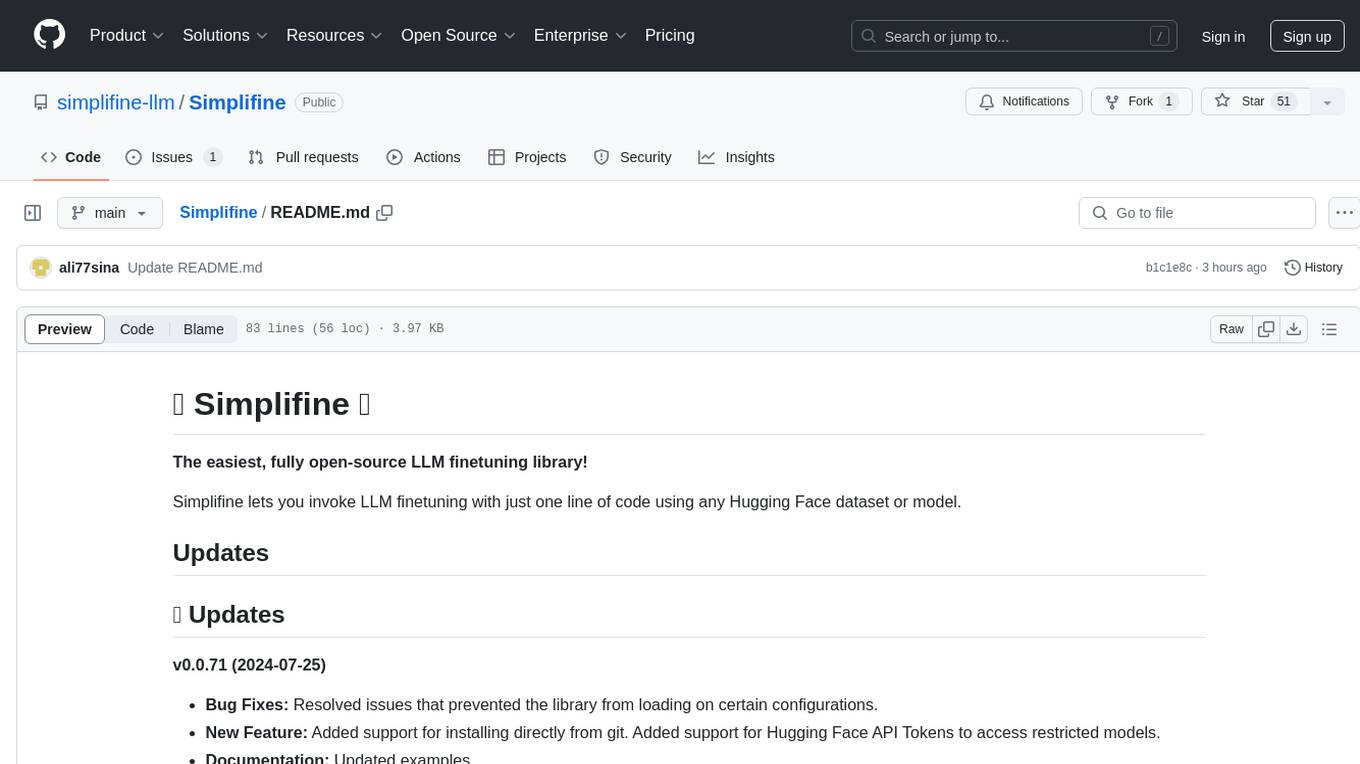
Simplifine
Simplifine is an open-source library designed for easy LLM finetuning, enabling users to perform tasks such as supervised fine tuning, question-answer finetuning, contrastive loss for embedding tasks, multi-label classification finetuning, and more. It provides features like WandB logging, in-built evaluation tools, automated finetuning parameters, and state-of-the-art optimization techniques. The library offers bug fixes, new features, and documentation updates in its latest version. Users can install Simplifine via pip or directly from GitHub. The project welcomes contributors and provides comprehensive documentation and support for users.

UltraRAG
The UltraRAG framework is a researcher and developer-friendly RAG system solution that simplifies the process from data construction to model fine-tuning in domain adaptation. It introduces an automated knowledge adaptation technology system, supporting no-code programming, one-click synthesis and fine-tuning, multidimensional evaluation, and research-friendly exploration work integration. The architecture consists of Frontend, Service, and Backend components, offering flexibility in customization and optimization. Performance evaluation in the legal field shows improved results compared to VanillaRAG, with specific metrics provided. The repository is licensed under Apache-2.0 and encourages citation for support.

qdrant
Qdrant is a vector similarity search engine and vector database. It is written in Rust, which makes it fast and reliable even under high load. Qdrant can be used for a variety of applications, including: * Semantic search * Image search * Product recommendations * Chatbots * Anomaly detection Qdrant offers a variety of features, including: * Payload storage and filtering * Hybrid search with sparse vectors * Vector quantization and on-disk storage * Distributed deployment * Highlighted features such as query planning, payload indexes, SIMD hardware acceleration, async I/O, and write-ahead logging Qdrant is available as a fully managed cloud service or as an open-source software that can be deployed on-premises.
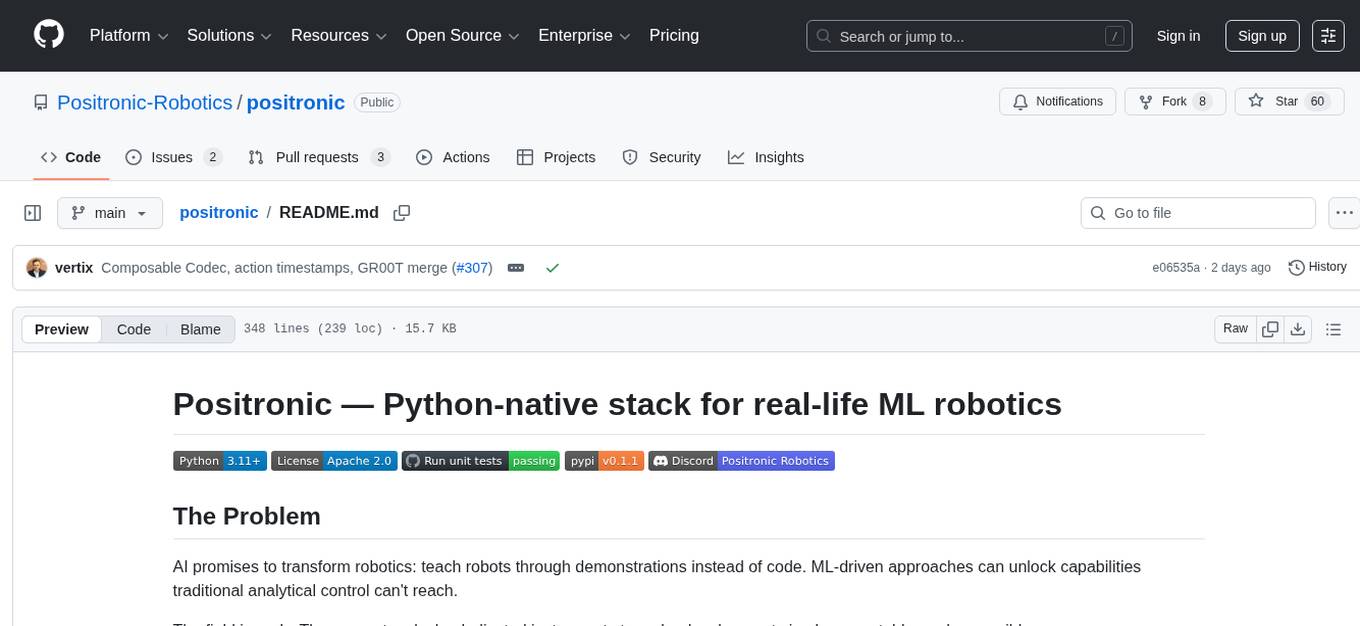
positronic
Positronic is an end-to-end toolkit for building ML-driven robotics systems, aiming to simplify data collection, messy data handling, and complex deployment in the field of robotics. It provides a Python-native stack for real-life ML robotics, covering hardware integration, dataset curation, policy training, deployment, and monitoring. The toolkit is designed to make professional-grade ML robotics approachable, without the need for ROS. Positronic offers solutions for data ops, hardware drivers, unified inference API, and iteration workflows, enabling teams to focus on developing manipulation systems for robots.
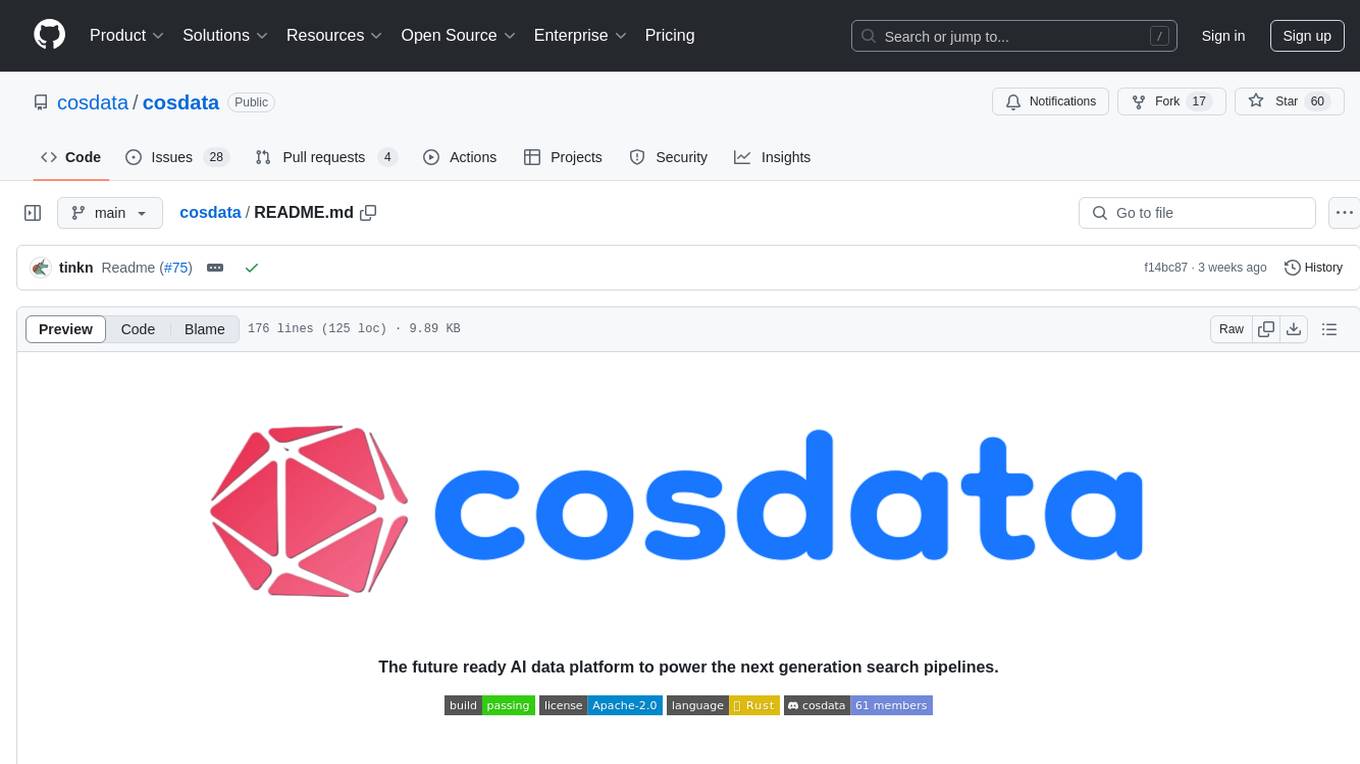
cosdata
Cosdata is a cutting-edge AI data platform designed to power the next generation search pipelines. It features immutability, version control, and excels in semantic search, structured knowledge graphs, hybrid search capabilities, real-time search at scale, and ML pipeline integration. The platform is customizable, scalable, efficient, enterprise-grade, easy to use, and can manage multi-modal data. It offers high performance, indexing, low latency, and high requests per second. Cosdata is designed to meet the demands of modern search applications, empowering businesses to harness the full potential of their data.
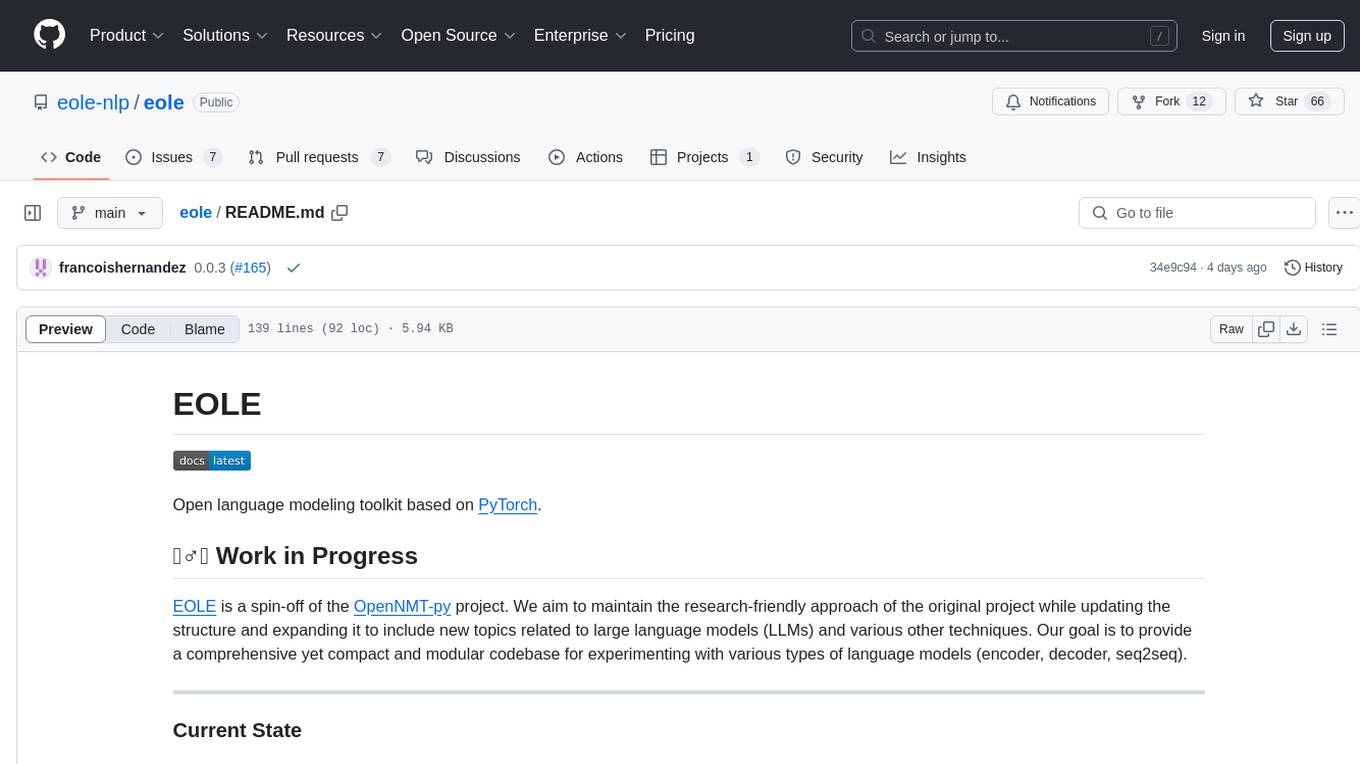
eole
EOLE is an open language modeling toolkit based on PyTorch. It aims to provide a research-friendly approach with a comprehensive yet compact and modular codebase for experimenting with various types of language models. The toolkit includes features such as versatile training and inference, dynamic data transforms, comprehensive large language model support, advanced quantization, efficient finetuning, flexible inference, and tensor parallelism. EOLE is a work in progress with ongoing enhancements in configuration management, command line entry points, reproducible recipes, core API simplification, and plans for further simplification, refactoring, inference server development, additional recipes, documentation enhancement, test coverage improvement, logging enhancements, and broader model support.
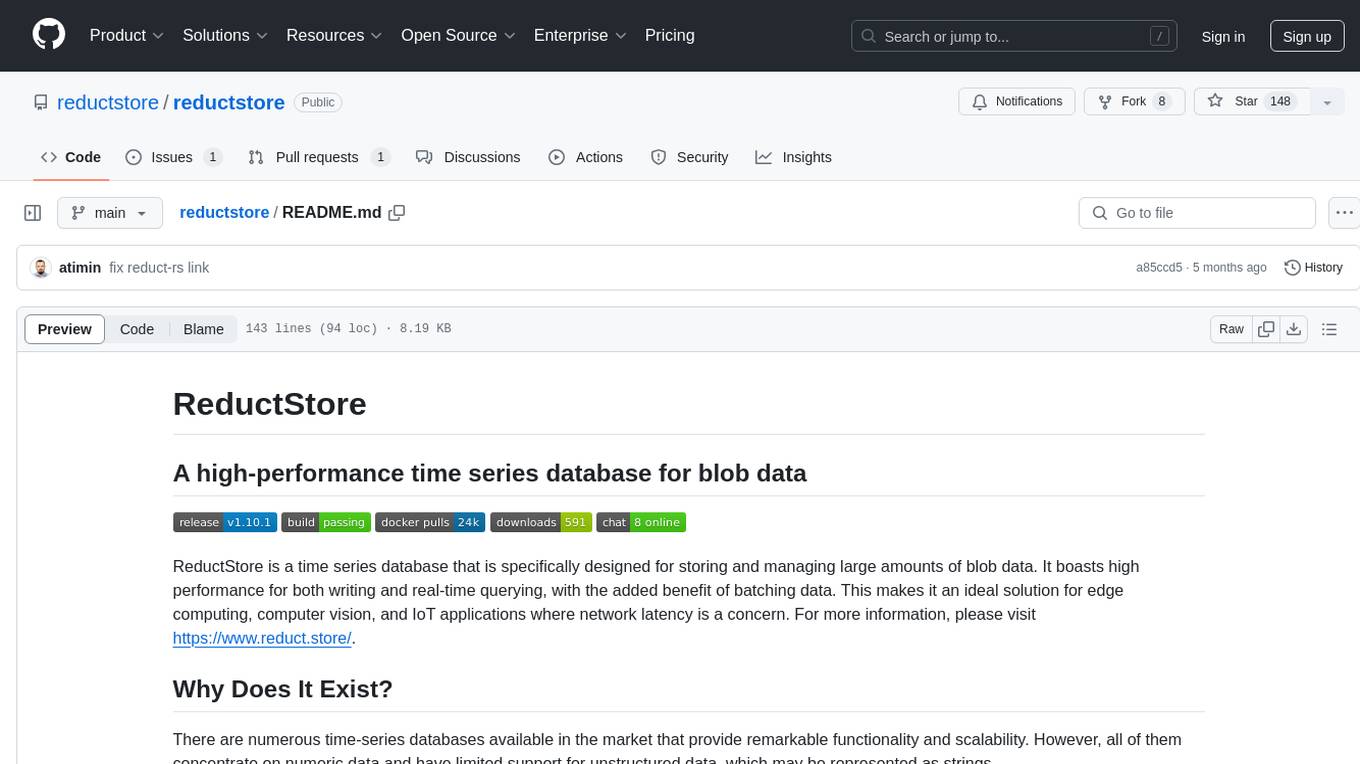
reductstore
ReductStore is a high-performance time series database designed for storing and managing large amounts of unstructured blob data. It offers features such as real-time querying, batching data, and HTTP(S) API for edge computing, computer vision, and IoT applications. The database ensures data integrity, implements retention policies, and provides efficient data access, making it a cost-effective solution for applications requiring unstructured data storage and access at specific time intervals.
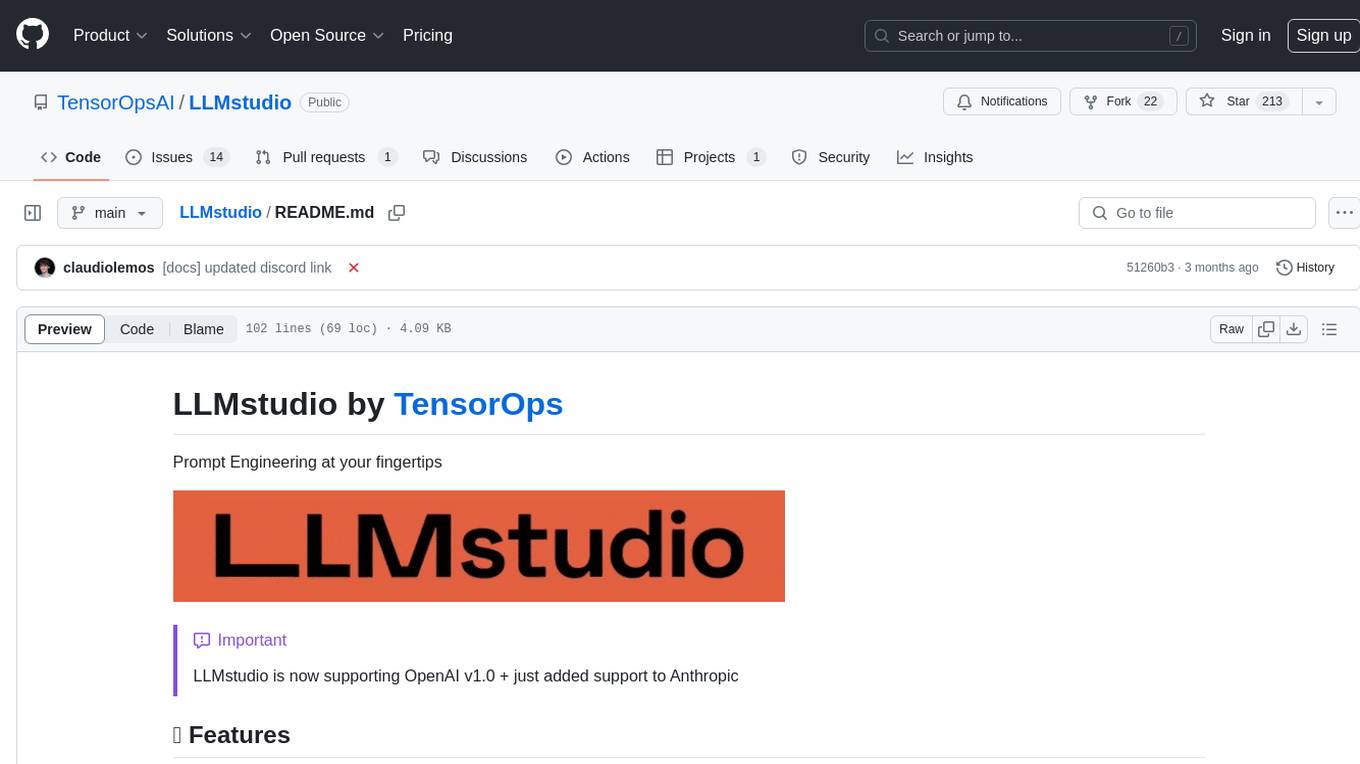
LLMstudio
LLMstudio by TensorOps is a platform that offers prompt engineering tools for accessing models from providers like OpenAI, VertexAI, and Bedrock. It provides features such as Python Client Gateway, Prompt Editing UI, History Management, and Context Limit Adaptability. Users can track past runs, log costs and latency, and export history to CSV. The tool also supports automatic switching to larger-context models when needed. Coming soon features include side-by-side comparison of LLMs, automated testing, API key administration, project organization, and resilience against rate limits. LLMstudio aims to streamline prompt engineering, provide execution history tracking, and enable effortless data export, offering an evolving environment for teams to experiment with advanced language models.
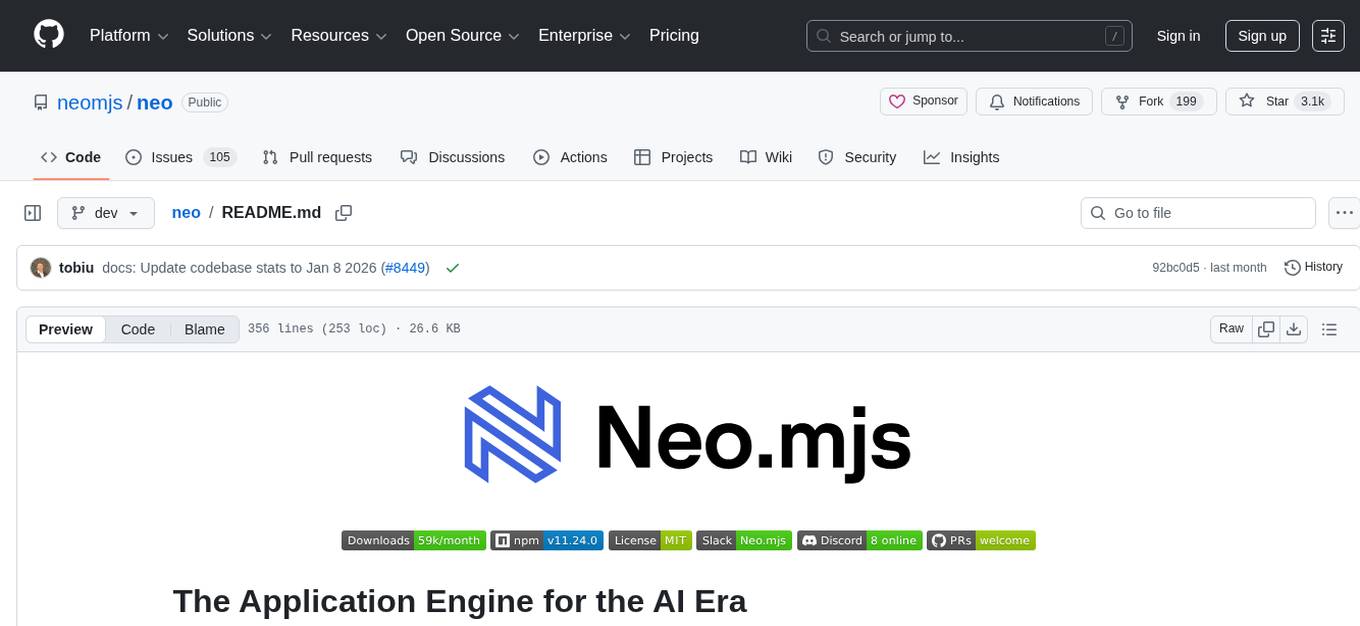
neo
Neo.mjs is a revolutionary Application Engine for the web that offers true multithreading and context engineering, enabling desktop-class UI performance and AI-driven runtime mutation. It is not a framework but a complete runtime and toolchain for enterprise applications, excelling in single page apps and browser-based multi-window applications. With a pioneering Off-Main-Thread architecture, Neo.mjs ensures butter-smooth UI performance by keeping the main thread free for flawless user interactions. The latest version, v11, introduces AI-native capabilities, allowing developers to work with AI agents as first-class partners in the development process. The platform offers a suite of dedicated Model Context Protocol servers that give agents the context they need to understand, build, and reason about the code, enabling a new level of human-AI collaboration.
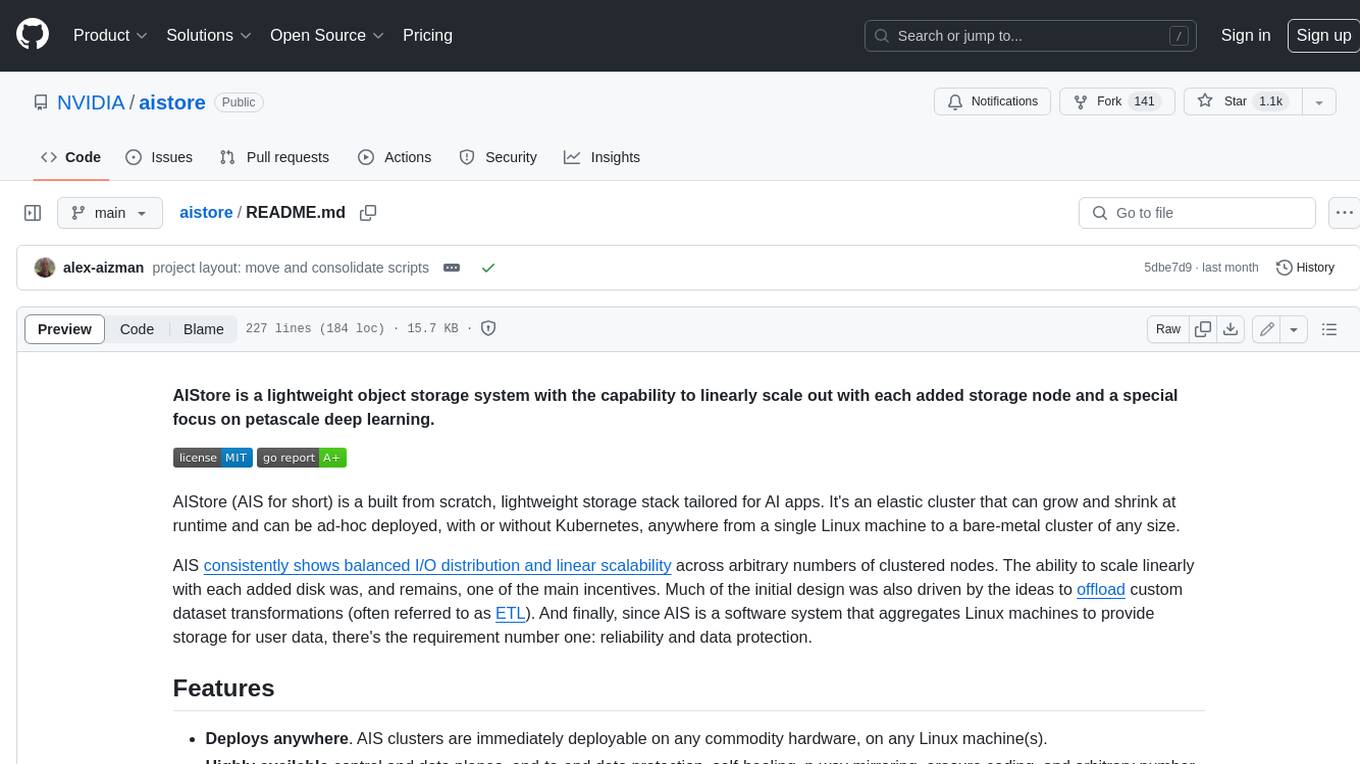
aistore
AIStore is a lightweight object storage system designed for AI applications. It is highly scalable, reliable, and easy to use. AIStore can be deployed on any commodity hardware, and it can be used to store and manage large datasets for deep learning and other AI applications.
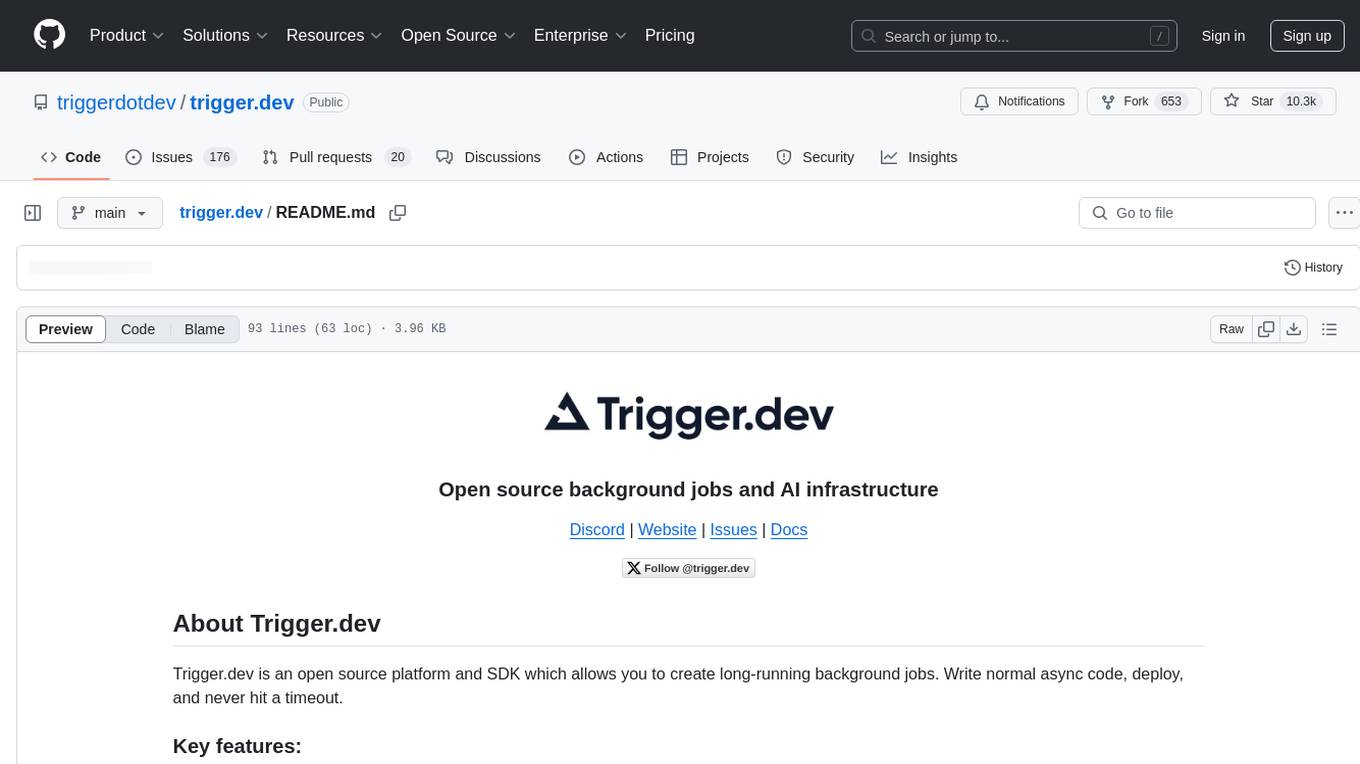
trigger.dev
Trigger.dev is an open source platform and SDK for creating long-running background jobs. It provides features like JavaScript and TypeScript SDK, no timeouts, retries, queues, schedules, observability, React hooks, Realtime API, custom alerts, elastic scaling, and works with existing tech stack. Users can create tasks in their codebase, deploy tasks using the SDK, manage tasks in different environments, and have full visibility of job runs. The platform offers a trace view of every task run for detailed monitoring. Getting started is easy with account creation, project setup, and onboarding instructions. Self-hosting and development guides are available for users interested in contributing or hosting Trigger.dev.
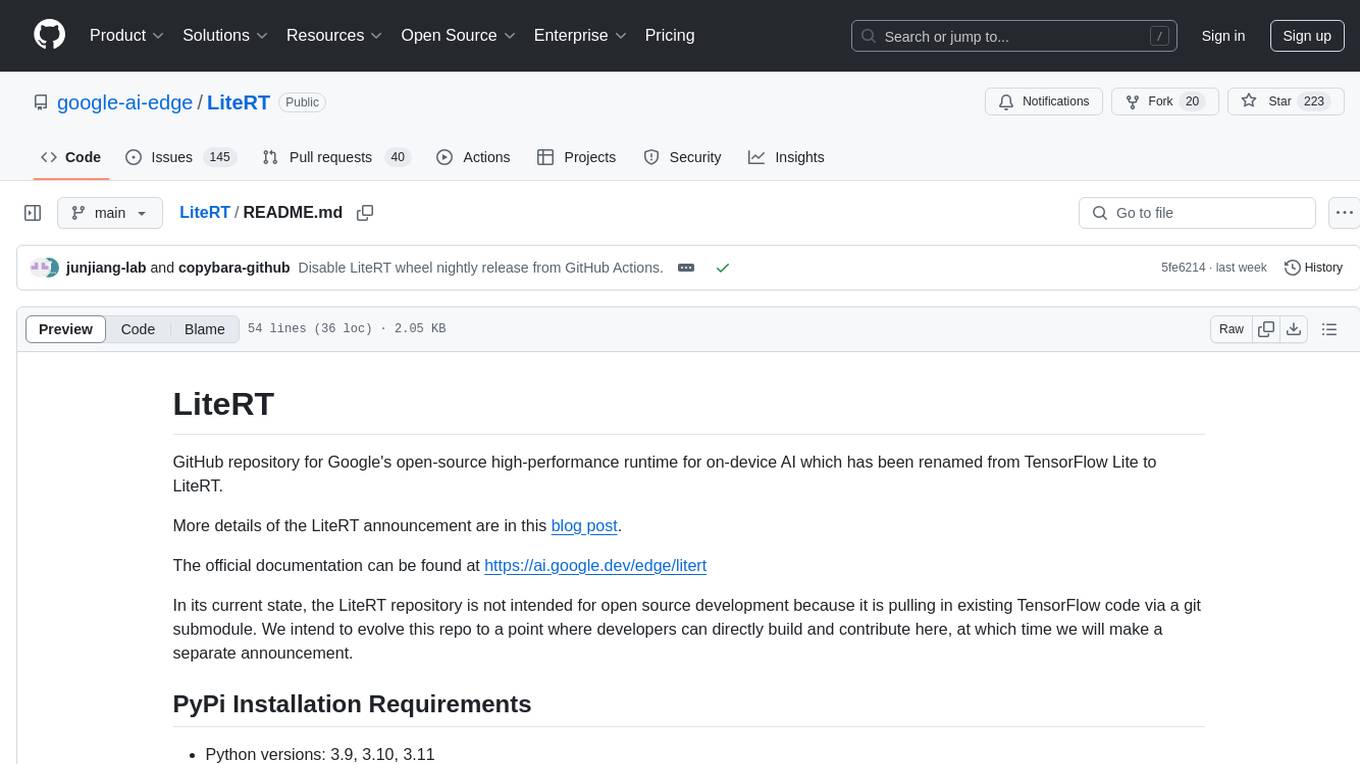
LiteRT
LiteRT is Google's open-source high-performance runtime for on-device AI, previously known as TensorFlow Lite. The repository is currently not intended for open-source development, but aims to evolve to allow direct building and contributions. LiteRT supports Python versions 3.9, 3.10, 3.11 on Linux and MacOS. It ensures compatibility with existing .tflite file extension and format, offering conversion tools and continued active development under the name LiteRT.
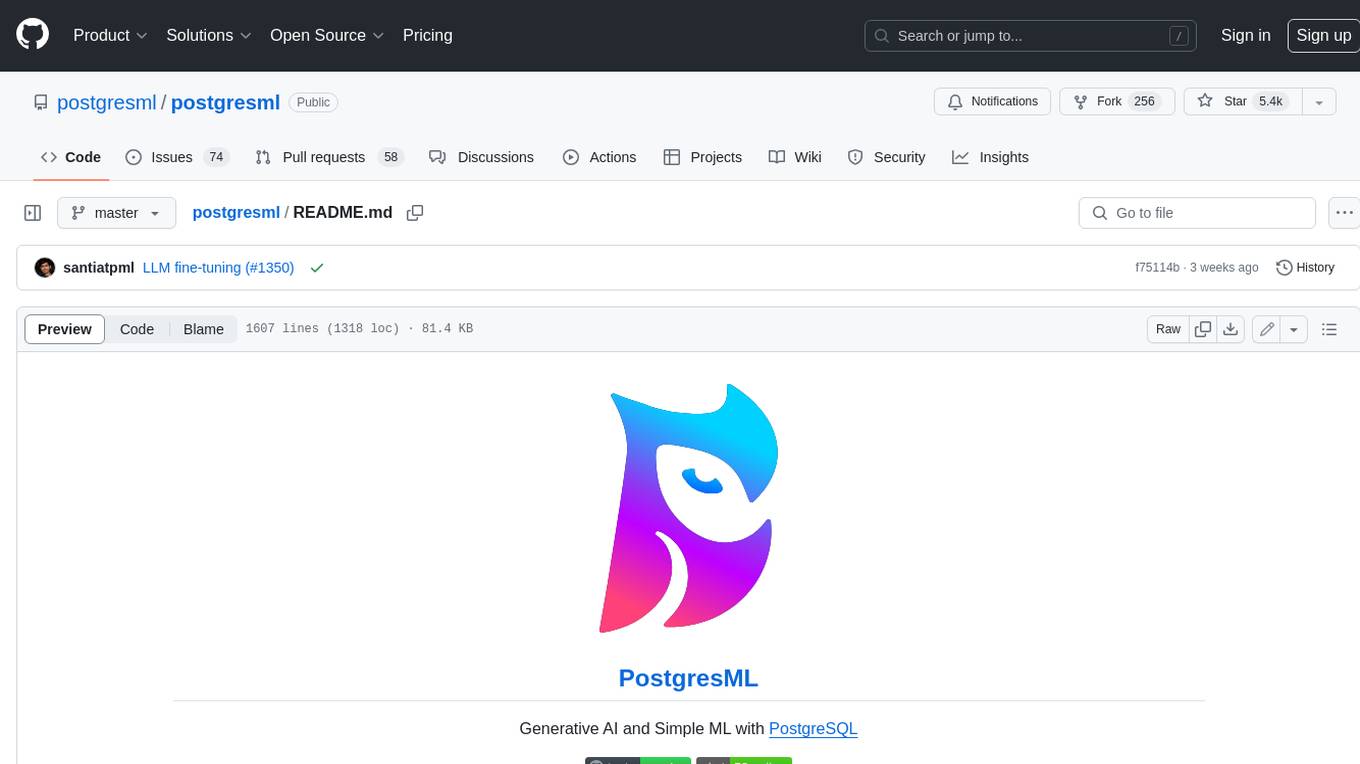
postgresml
PostgresML is a powerful Postgres extension that seamlessly combines data storage and machine learning inference within your database. It enables running machine learning and AI operations directly within PostgreSQL, leveraging GPU acceleration for faster computations, integrating state-of-the-art large language models, providing built-in functions for text processing, enabling efficient similarity search, offering diverse ML algorithms, ensuring high performance, scalability, and security, supporting a wide range of NLP tasks, and seamlessly integrating with existing PostgreSQL tools and client libraries.

minefield
BitBom Minefield is a tool that uses roaring bit maps to graph Software Bill of Materials (SBOMs) with a focus on speed, air-gapped operation, scalability, and customizability. It is optimized for rapid data processing, operates securely in isolated environments, supports millions of nodes effortlessly, and allows users to extend the project without relying on upstream changes. The tool enables users to manage and explore software dependencies within isolated environments by offline processing and analyzing SBOMs.
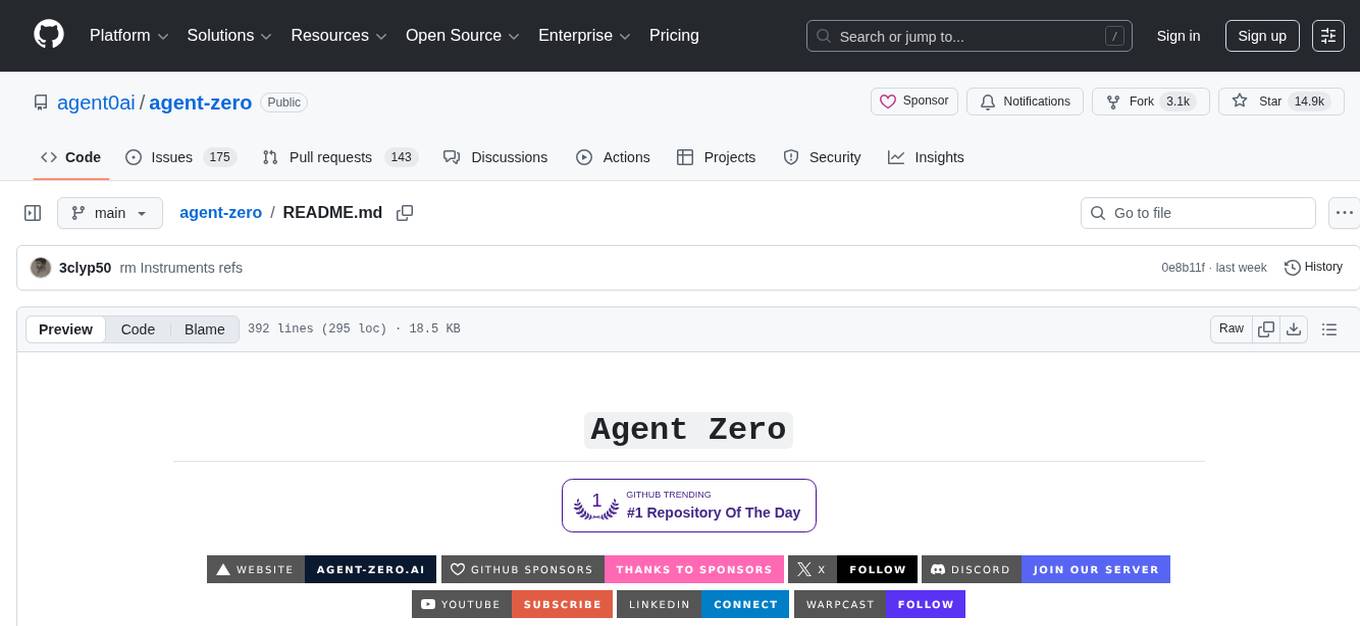
agent-zero
Agent Zero is a personal, organic agentic framework designed to be dynamic, transparent, customizable, and interactive. It uses the computer as a tool to accomplish tasks, with features like general-purpose assistant, computer as a tool, multi-agent cooperation, customizable and extensible framework, and communication skills. The tool is fully Dockerized, with Speech-to-Text and TTS capabilities, and offers real-world use cases like financial analysis, Excel automation, API integration, server monitoring, and project isolation. Agent Zero can be dangerous if not used properly and is prompt-based, guided by the prompts folder. The tool is extensively documented and has a changelog highlighting various updates and improvements.
For similar tasks

Azure-Analytics-and-AI-Engagement
The Azure-Analytics-and-AI-Engagement repository provides packaged Industry Scenario DREAM Demos with ARM templates (Containing a demo web application, Power BI reports, Synapse resources, AML Notebooks etc.) that can be deployed in a customer’s subscription using the CAPE tool within a matter of few hours. Partners can also deploy DREAM Demos in their own subscriptions using DPoC.

sorrentum
Sorrentum is an open-source project that aims to combine open-source development, startups, and brilliant students to build machine learning, AI, and Web3 / DeFi protocols geared towards finance and economics. The project provides opportunities for internships, research assistantships, and development grants, as well as the chance to work on cutting-edge problems, learn about startups, write academic papers, and get internships and full-time positions at companies working on Sorrentum applications.

tidb
TiDB is an open-source distributed SQL database that supports Hybrid Transactional and Analytical Processing (HTAP) workloads. It is MySQL compatible and features horizontal scalability, strong consistency, and high availability.

zep-python
Zep is an open-source platform for building and deploying large language model (LLM) applications. It provides a suite of tools and services that make it easy to integrate LLMs into your applications, including chat history memory, embedding, vector search, and data enrichment. Zep is designed to be scalable, reliable, and easy to use, making it a great choice for developers who want to build LLM-powered applications quickly and easily.

telemetry-airflow
This repository codifies the Airflow cluster that is deployed at workflow.telemetry.mozilla.org (behind SSO) and commonly referred to as "WTMO" or simply "Airflow". Some links relevant to users and developers of WTMO: * The `dags` directory in this repository contains some custom DAG definitions * Many of the DAGs registered with WTMO don't live in this repository, but are instead generated from ETL task definitions in bigquery-etl * The Data SRE team maintains a WTMO Developer Guide (behind SSO)

mojo
Mojo is a new programming language that bridges the gap between research and production by combining Python syntax and ecosystem with systems programming and metaprogramming features. Mojo is still young, but it is designed to become a superset of Python over time.

pandas-ai
PandasAI is a Python library that makes it easy to ask questions to your data in natural language. It helps you to explore, clean, and analyze your data using generative AI.

databend
Databend is an open-source cloud data warehouse that serves as a cost-effective alternative to Snowflake. With its focus on fast query execution and data ingestion, it's designed for complex analysis of the world's largest datasets.
For similar jobs

weave
Weave is a toolkit for developing Generative AI applications, built by Weights & Biases. With Weave, you can log and debug language model inputs, outputs, and traces; build rigorous, apples-to-apples evaluations for language model use cases; and organize all the information generated across the LLM workflow, from experimentation to evaluations to production. Weave aims to bring rigor, best-practices, and composability to the inherently experimental process of developing Generative AI software, without introducing cognitive overhead.

LLMStack
LLMStack is a no-code platform for building generative AI agents, workflows, and chatbots. It allows users to connect their own data, internal tools, and GPT-powered models without any coding experience. LLMStack can be deployed to the cloud or on-premise and can be accessed via HTTP API or triggered from Slack or Discord.

VisionCraft
The VisionCraft API is a free API for using over 100 different AI models. From images to sound.

kaito
Kaito is an operator that automates the AI/ML inference model deployment in a Kubernetes cluster. It manages large model files using container images, avoids tuning deployment parameters to fit GPU hardware by providing preset configurations, auto-provisions GPU nodes based on model requirements, and hosts large model images in the public Microsoft Container Registry (MCR) if the license allows. Using Kaito, the workflow of onboarding large AI inference models in Kubernetes is largely simplified.

PyRIT
PyRIT is an open access automation framework designed to empower security professionals and ML engineers to red team foundation models and their applications. It automates AI Red Teaming tasks to allow operators to focus on more complicated and time-consuming tasks and can also identify security harms such as misuse (e.g., malware generation, jailbreaking), and privacy harms (e.g., identity theft). The goal is to allow researchers to have a baseline of how well their model and entire inference pipeline is doing against different harm categories and to be able to compare that baseline to future iterations of their model. This allows them to have empirical data on how well their model is doing today, and detect any degradation of performance based on future improvements.

tabby
Tabby is a self-hosted AI coding assistant, offering an open-source and on-premises alternative to GitHub Copilot. It boasts several key features: * Self-contained, with no need for a DBMS or cloud service. * OpenAPI interface, easy to integrate with existing infrastructure (e.g Cloud IDE). * Supports consumer-grade GPUs.

spear
SPEAR (Simulator for Photorealistic Embodied AI Research) is a powerful tool for training embodied agents. It features 300 unique virtual indoor environments with 2,566 unique rooms and 17,234 unique objects that can be manipulated individually. Each environment is designed by a professional artist and features detailed geometry, photorealistic materials, and a unique floor plan and object layout. SPEAR is implemented as Unreal Engine assets and provides an OpenAI Gym interface for interacting with the environments via Python.

Magick
Magick is a groundbreaking visual AIDE (Artificial Intelligence Development Environment) for no-code data pipelines and multimodal agents. Magick can connect to other services and comes with nodes and templates well-suited for intelligent agents, chatbots, complex reasoning systems and realistic characters.


